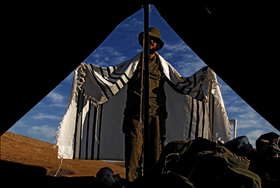Money Management
Hiddush to the Treasury: Transfer allocated funds to recruit ultra-Orthodox men
Knesset working group discovers that recruitment of 200 ultra-Orthodox men was rejected because the Treasury is unwilling to fulfill commits to pay. Rabbi Uri Regev: “Recruiting ultra-Orthodox men is an investment in the economy, not rivaled by many.” Calls on ultra-Orthodox political parties to join the struggle
24/10/2011 18:13
Tags: Army exemptions · Haredim · Army · Treasury · Knesset commitees and Haredim

A soldier at prayer Flash 90
Hiddush CEO Rabbi Uri Regev demands that Finance Minister Yuval Steinitz immediately transfer extra funds to the army in order for the IDF to recruit yeshiva students who are interested. Regev says, “The refusal of the treasury to provide additional funds to recruit ultra-Orthodox men is tantamount to a public scandal and an incomparable oversight. It cannot be that the government decides that recruiting ultra-Orthodox Jews to the army is an urgent national goal and the Finance Ministry ignores it. The prime minister must decide if this is a country in which there is a treasury or a treasury that happens to have a country.”
According to Regev, “Just as there is a price to yeshiva studies, there is also a price to recruiting ultra-Orthodox Jews [to the army]. It is absurd to generously fund yeshiva studies, yet to refuse to fund programs that will promote equality with respect to the financial burdens [of society] and help the integration of the ultra-Orthodox into the economy, as well as broader society. The price of recruiting ultra-Orthodox soldiers is an investment that has the potential for returns.” Regev called on the heads of ultra-Orthodox political parties to do everything within their proven capabilities to mobilize the state budget to provide necessary funding to recruiting ultra-Orthodox men who are ready to serve.
The IDF could potentially recruit 700 Yeshiva students yearly to the Shahar tracks (service for ultra-Orthodox men). In actuality, they only recruited 500 because the Treasury has refused to provide the additional funding necessary. This was revealed on Oct. 23, 2011 by the Planning and Manpower Administration Brig. Gen. Amir Rogovsky in a meeting of the supervisory staff for the Tal Law led by MK Yohanan Plesner.
Just as there is a price to yeshiva studies, there is also a price to recruiting ultra-Orthodox Jews [to the army].
Young religious men who enlisted in the Shahar track receive professional technological training to support combat and serve a significant 18 months to two years. These tracks are popular among young religious men because it provides them with vocational training they can use in civilian life and opportunities for families that live on minimum wage or slightly more. The cost of a Shahar soldier is approximately NIS 65,000 per year.
According to the original plan, the IDF was supposed to recruit 500 soldiers to Shahar yearly and 300 more to Shlav Bet, a track in which religious men serve three months, at the end of which they join the reserve forces immediately. The IDF claims that the demand for Shlav Bet service was very low. It does not provide professional training and because the option is available only from age 26 or above, when they have already received an exemption from required military service. The IDF itself is not too keen to enlist yeshiva students this limited period either, and therefore only recruited about 50 people a year for Shlav Bet.
The Treasury has not yet transferred the additional funds the government already approved for use in recruiting ultra-Orthodox soldiers to the IDF, totaling approximately NIS 140 million. Brig. Gen. Rogovsky warned that the issue would likely damage recruitment programs for next year because they would not be able to built infrastructure, such as classrooms, on a timely basis.
To see the Jerusalem Post's coverage of Hiddush's opposition to this withholding of funds, click here